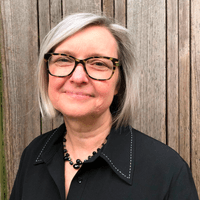

Kim England
Kim England
Department of Geography, University of Washington
About
Professor, Department of Geography, University of Washington
Harry Bridges Endowed Chair in Labor Studies Emerita, University of Washington
Adjunct Professor of Gender, Women and Sexuality Studies
Affiliate of the Canadian Studies Center (Jackson School of International Studies), the Harry Bridges Center for Labor Studies & the West Coast Poverty Center.
NOTE: I am not accepting new graduate students for the 2026/27 academic year
______________________________________________
My undergraduate degree (Combined Studies) is from the University of Leicester, UK and my MA and PhD (both in Geography) are from the Ohio State University. Prior to coming to the University of Washington, I was at the University of Toronto. I teach classes on urban/social geography, the geographies of inequalities and feminist geographies. From 2018 to 2022, I was the Harry Bridges Endowed Chair in Labor Studies and the Director of the Harry Bridges Center for Labor Studies at the University of Washington. I am currently a member of the steering committee of the Carework Network (an international organization of researchers, policymakers,and advocates involved in various domains of care work).
My research spans feminist, economic, social and political geographies, particularly in terms of the relationships between care, paid work and the home, and the interconnections between inequalities, social reproduction and the state, primarily in urban North America. I have a long-standing interest in the geographies of care, work and diversity, including the shifting contours of welfare, care migration, the meanings of home and the experiences of care workers. My current focus is the migration of care workers, domestic workers’ activism and workplace rights.
My research is driven by questions about equality, social justice and the relationships between social reproduction, the state, labor markets, and discourses regarding collective versus individual responsibilities. In earlier projects I examined local clerical labor markets and the suburbanization of office work; the gendering of urban spaces and feminist urban politics; parents’ child care strategies and the experiences of live-in domestic workers and nannies. I have an ongoing interest in the interconnections between critical theories, epistemologies and research methods, including the politics and ethics of doing research.- RESEARCH

Care workers' migration and activism
I explore various aspects of the globalization of care work and the ways this knits together the restructuring of care within nation-states, transnational migration and embodiment. Through care work ‘local’ and transnational systems of gendered and racialized hierarchies, cultural representations and political-economic processes converge in the intimate spaces of bodies and homes as well as institutional settings. Previously I explored these ideas in the context of the politics and ethics of recruiting internationally trained nurses. Now I focus on the public policies and activism aimed at improving the working conditions and economic security of domestic workers in the US.

Homes, Bodies and Care
In a series of papers, primarily written with Isabel Dyck (Geography, University of London, Queen Mary), I addressed the emergence of a neoliberal agenda for home care and on consequential discourses, practices and processes of care. Our empirical work draws from an interdisciplinary project on the home as a site of long-term care in urban and rural locations across Ontario. We investigate home care from the perspective of the paid home care workers – nurses, attendants, and personal support workers, as well as long-term care recipients and their family caregivers. Isabel and I framed our papers around the materialities of home, risk and care ethics, embodiment and body work, masculinities and migration.
 Work, Employment and Workplace Diversity
Work, Employment and Workplace DiversityThis research explores employment, home-work linkages and socio-economic change in large cities, the social and cultural dimensions of workplace dynamics and the organization of firms. One strand is driven by questions of diversity, social justice and social policy aimed at the workplace. Another strand involves the historical analysis of the constructions of urban femininities in North American white-collar workplaces in the context of social and technological change over the broad sweep of the 20th Century (this work was in collaboration with Kate Boyer, Geography and Planning, Cardiff University).

Cities and Urbanism
I was a core and founding member of UW’s Cities Collaboratory (CitiesCollab), which later (in 2015) became the foundation of the university-wide initiative Urban@UW. CitiesCollab was funded by UW's Simpson Center for the Humanities, and the Colleges of Arts and Science, the Built Environments, the Environment, and the School of Social Work. We explored the dynamic of cities from social science and humanities perspectives, and developed the Lake Union Laboratory (LULab), a teaching and faculty-student research project focusing on one specific place within Seattle. The teaching component of our collaboration was featured in the UW 2014 Provost’s report on technology and teaching.
TEACHING
Geography 431: Geography and Gender - Autumn 2025
Geography 541: Feminist Geographies: Care, Work and Activism - Autumn 2025
Geographies 342: Geographies of Inequalities - Winter 2026
Geography 262: Geographies of Everyday Life - Spring 2026
GEOG 262: Geographies of Everyday Life This class explores the spaces, places and social relationsof people’s everyday life. Geographical relations shape where people live, work and play; as well as the streets they regularly move along and the buildings that mark their daily paths and routines. Focusing on geographies of everyday life also provides a way to trace connections between the local and broader processes, practices and relations of power, such as government policy and economic globalization. This class equips students with the tools to comprehend and analyze the socio-spatial context of everyday life in all its multiscalar complexities.
GEOG 342: Geographies of Inequalities This course considers the geographies of social, political and economic inequalities. The focus will usually be on urban areas, although other spatial scales will also be examined. The course begins with discussions of the theoretical underpinnings of ‘inequality’. The remainder of the course builds on these ideas by exploring topics such as the spatial distribution of wealth and poverty, and the geographies of exclusion and discrimination in employment and housing. Particular emphasis is placed on the US and Canadian experience, although some examples are drawn from other regions of the world.
GEOG 431: Geography and Gender This course explores the reciprocal relations between gender relations (and intersectionality more broadly) and socio-spatial processes. Topics include: feminist theory and geography, organization of space, migration, poverty, housing and homelessness, paid employment, geographies of care, and urban politics. Particular emphasis is placed on the US and Canadian experience, although some examples are drawn from elsewhere.
GEOG/GWSS 541: Graduate Research Seminar: Feminist Geographies This graduate seminar explores major research themes in feminist geographies. The current focus is care, work and activism. Particular attention is given to the concept that gender identities and spaces are discursively and materially (re)produced. Uses theories associated with care (and social reproduction) and core geographical concepts (e.g. space, place and scale) to examine empirical and conceptual scholarship on a wide range of topics, including paid care work, caring cities, politics of pregnancy, factory work, and care workers' activism.
- Publications - Books

Child care policy, provision and funding has not kept up with the rapid increase in mothers in paid employment. Who Will Mind the Baby? (1996) explores how working mothers negotiate their responsibilities, and contrasts the limited child care policies of the United States and Canada with the situation in Europe and Australia.

Edited with Kevin Ward (University of Manchester and Georgia State University), Neoliberalization (2007) engages with theoretical concerns and empirical interrogations of the multi-dimensional and multi-scalar processes of neoliberalization through a series of spatially and substantively diverse case studies written by scholars from across the social sciences.
Publications - Papers and Chapters
A longer list of my publications can be found on ResearchGate and Academia.com. Also contact me if you are not able to access any of these.
- Samantha Thompson and Kim England (2025) “Care geographies: Work, home and bodies,” in Ishan Ashutosh and Jamie Winders (eds.) The Wiley Blackwell Companion to Cultural and Social Geography. Wiley & Sons: Chichester, UK, pp. 505-516.
- Ellie Cleasby and Kim England (2024) “Caring, mending, cleaning: Imagining more just communities of care through the Domestic Workers Coalition and Kantamanto Market” for a special issue “Critical Care” for Azimuth:Philosophical Coordinates in Modern and Contemporary Age Issue (XII (24): 267-286).
- Kim England, Isabel Dyck, Iliana Ortega-Alcázar, and Menah Raven-Ellison (2020) “Care, health and migration,” in Anindita Datta, Peter Hopkins, Lynda Johnston, Elizabeth Olson, and Joseli Maria Silva (Eds.) The Routledge International Handbook of Gender and Feminist Geographies. Routledge: London and New York, pp. 336-346.
- Linda Peake and Kim England (2020) “(What geographers should know about) The state of US and Canadian academic professional associations’ engagement with mental health practices and policies” The Professional Geographer, 72(1): 37-53.
- Kim England and Caitlin Alcorn (2018) "Growing care gaps, shrinking state? Home care workers and the Fair Labor Standards Act" Cambridge Journal of Regions Economy and Society, 11(3):443-457
- Karin Schwiter, Kendra Strauss and Kim England (2018) “At home with the boss: Live-in elder care workers in Austria, Canada, Switzerland and the UK,” Transactions of the Institute of British Geographers,43(3): 462-476
- Kim England (2018) “Women in the 0ffice: Clerical work, modernity and workplaces” in Alexandra Staub (ed.) Routledge Companion to Modernity, Space and Modernity, Space and Gender, Routledge: New York, pp. 86-99.
- Kim England (2017) “Home, domestic work and the state: The spatial politics of domestic workers activism,” Critical Social Policy, 37(3): 367-385.
- Kim England and Kevin Ward (2016) “Theorizing neoliberalization,” in Simon Springer, Kean Birch and Julie MacLeavy (eds.) The Handbook of Neoliberalism. Routledge: London.
- Kim England and Isabel Dyck (2016) “Global care at home: Transnational care workers caring for older people in Toronto,” in Katie Walsh and Lena Näre (eds.) Transnational Migration and Home in Older Age. Routledge, pp. 227-239.
- Kim England (2015) “Producing feminist geographies: Theory, methodologies and research strategies,” in Stuart Aitkin and Gill Valentine (eds.) Approaches to Human Geography (2nd Edition), pp. 361-372.
- Kim England (2015) “Nurses across borders: Global migration of Registered Nurses to the US” Gender, Place and Culture, 22 (1), 143-156.
- Kim England and Isabel Dyck (2014) “Masculinities, embodiment and care,” in Andrew Gorman-Murray and Peter Hopkins (eds.) Masculinities and Place, Ashgate, pp. 285-297.
- Kim England (2014) “Women, intersectionality and workplace equity,” in Carol Agócs (ed.) Employment Equity in Canada: The Legacy of the Abella Report, Toronto: University of Toronto Press, pp. 71-98.
- Kim England and Caitlin Henry (2013) “Care, migration and citizenship: Nurse Migration to the UK” Social and Cultural Geography, 14(5): 558-574. [pdf]
- Kim England (2013) “Clerical work” in Vicki Smith (ed.) Sociology of Work: An Encyclopedia, Sage.
- Kim England and Isabel Dyck (2012) “Migrant workers in home care: Responsibilities, routes and respect” Annals of the Association of American Geographers, 101 (5): 1076-1083. [pdf]
- Kim England (2012) “‘Everyday life is situated’: Politics, space and feminist theory,” in Andrew Jonas and Andrew Wood (eds) Territory, The State and Urban Politics: New Critical Directions, Ashgate: Burlington, VT, pp. 187-202.
- Isabel Dyck and Kim England (2012) “Homes for care: Reconfiguring care relations and practices” in Christine Ceci, Kristin Bjornsdottir and Mary Ellen Purkis (eds.) Home, Care, Practices: Critical Perspectives on Care at Home for Older People. Routledge: New York, pp. 62-77. [pdf]
- Kim England (2011) “Spatial stories: Belltown, Denny Hill and Pike Place Market” contribution to “Social Geographies” chapter in Michael Brown and Richard L. Morrill (Eds) Seattle Geographies. Seattle: UW Press, pp. 144-150.
- Kim England and Isabel Dyck (2011) “Managing the body work of home care” themed issue ‘Body Work’ in Sociology of Health and Illness, 33 (2): 206-219. [pdf]
- Kim England (2010) “Home, paid care work and geographies of responsibilities,” special issue on ‘Care-full Geographies’ Ethics, Place and Environment, 13(2): 131-150. [pdf]
Some older papers of note:
- Kim England and Kate Boyer (2009) “Women’s work: The feminization and shifting meanings of clerical work” Journal of Social History, 43(2): 307-340. [pdf]
- Kate Boyer and Kim England (2008) “Gender, work and technology in the information workplace: From typewriters to ATMs” Social and Cultural Geography, 9 (3): 241-256. [pdf]
- Kim England (2008) “Welfare provision, welfare reform, welfare mothers,” in Kevin Cox, Murray Low and Jennifer Robinson (eds.) Handbook of Political Geography, Sage: London and Thousand Oaks, CA. [pdf]
- Kim England (2003) "Disabilities, gender and gmployment: Social gxclusion, Employment Equity and Canadian banking,” The Canadian Geographer, 47(4): 429-450. [pdf]
- Bernadette Stiell and Kim England (1997) "Domestic distinctions: Constructing difference among paid domestic workers in Toronto,” Gender, Place and Culture, 4(3): 339-359. [pdf]
- Kim England and Bernadette Stiell (1997) "'They think you're as stupid as your English is': Constructing foreign domestic workers in Toronto,” Environment and Planning A, 29(2): 195-215. [pdf]
- Kim England (1995) "'Girls in the office': Job search and recruiting in a local clerical labor market,” Environment and Planning A, 27(12): 1995-2018. [pdf]
- Kim England (1993) "Suburban pink collar ghettos: The spatial entrapment of women?” Annals of the Association of American Geographers, 83(2): 225-242 (and see the exchange with Susan Hanson and Geraldine Pratt, Annals of the Association of American Geographers, 1994, 84(3): 500-504). [pdf]
- Kim England (1994) "Getting personal: Reflexivity, positionality and feminist research,” The Professional Geographer, 46(1): 80-89. [pdf]
- Kim England (1991) "Gender relations and the spatial structure of the city," Geoforum, 1991, 22(2): 135-147. [pdf]
 In the Media
In the Media- Kim England and Michael McCann (2022) “Americans rediscover labor unions,” lead op-ed in the Opinion section, Seattle Times, 18 March.
- Hannelore Sudermann (2022) “Washington marks 50 years of equality for women under the law,” UW Alumni Magazine, (March) – interviewed and contributed sources.
- Paige Browning (2022) “Roastery, Gaybucks, others could be just the start of Starbucks union,” KUOW (April). Interviewed for print and radio stories.
- Spencer Soper (2022) “Legislature considers constraints on Amazon’s ‘rank-and-yank’ worker ratings” Seattle Times (January) interviewed.
- Spencer Soper (2022) “Amazon Is Focus of Push to Curb ‘Rank-and-Yank’ Worker Ratings” Bloomberg News (January) interviewed.
- Austin Jenkins (2021) “Unions in Washington state secure wins under Democratic one-party rule in Olympia,” KUOW (August) interviewed.
- Joseph O’Sullivan (2021) “How unions are racking up new wins in Democratic-controlled Washington state,” Seattle Times (August) interviewed.
- Kim England (2020) “Labor Day 2020: A life-and-death fight for worker rights,” lead op-ed in the Opinion section, Seattle Times, 4 Sept 2020.
- Nancy Joseph (2020) “The Labor of COVID,” UW Arts and Science’s Perspective Newsletter (July) interviewed with Carrie Freshour.
- David Jepson (2019) “Labor Wars of the Northwest: The Struggle that Defined the Region,” interviewed (film exploring the working conditions of working-class women and men at the turn of the 20th Century).
- Rebecca Tan (2019) “D.C. protects most workers from discrimination. But not nannies or housekeepers,” Washington Post (August) interviewed.
- ContactDepartment of GeographySmith HallBox 353560University of WashingtonSeattle, WA 98195-3560Email: england [at] uw.edu












